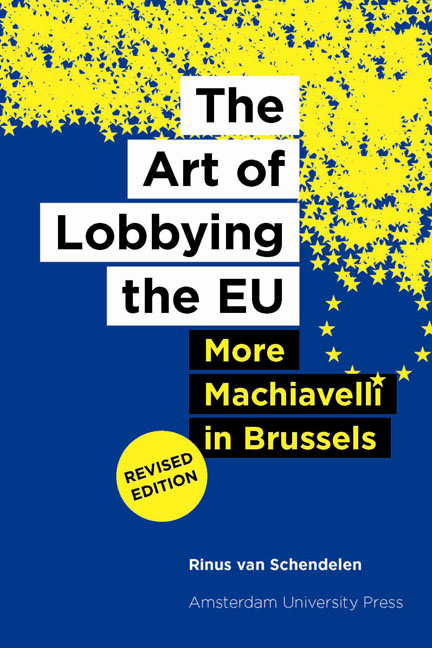Book contents
- Frontmatter
- Dedication
- Contents
- Detailed Contents
- Special Preface to the Fourth Edition: Ten Years’ Anniversary of this Book
- List of Figures
- List of Best Websites
- List of Abbreviations
- 1 The Europeanization of Public Affairs
- 2 The Playing-Field: EU Common Decision-Making
- 3 Pushing the Buttons of ‘Brussels’
- 4 Getting Grip on an EU Arena
- 5 Managing the Home Front
- 6 Managing the EU Fieldwork
- 7 The Limits of EU Public Affairs Management
- 8 Public Affairs, Lobbying and EU Democracy
- References
- Index
Special Preface to the Fourth Edition: Ten Years’ Anniversary of this Book
Published online by Cambridge University Press: 10 December 2020
- Frontmatter
- Dedication
- Contents
- Detailed Contents
- Special Preface to the Fourth Edition: Ten Years’ Anniversary of this Book
- List of Figures
- List of Best Websites
- List of Abbreviations
- 1 The Europeanization of Public Affairs
- 2 The Playing-Field: EU Common Decision-Making
- 3 Pushing the Buttons of ‘Brussels’
- 4 Getting Grip on an EU Arena
- 5 Managing the Home Front
- 6 Managing the EU Fieldwork
- 7 The Limits of EU Public Affairs Management
- 8 Public Affairs, Lobbying and EU Democracy
- References
- Index
Summary
A synthesized navigator's guide
This is not a typical book about interest groups trying to influence public authorities like civil servants and politicians in general and those in the European Union (EU) in particular. More books and articles address the general question (or part of it) and even discuss its application to the EU. In each, one or more authors present their own views and/or findings and sometimes they compare theirs with those of others. The synthesis of all the different little bits of assumed knowledge they leave to the reader, however. By its ambition to create this synthesis, this book stands out as a navigator that can help the interested reader to gain a better understanding of the many pitfalls of attempting to influence public authorities and other stakeholders in general and those at the EU level in particular – in short, to increase their chances of success. The author, privileged by over forty years of both academic study and applied practise in this field, has simply collected here ‘everything that anybody might know if having had the same privileges’.
The backgrounds of the book
On substance the book has two objectives. The first and general one is to synthesize how interest groups can influence public authorities and other stakeholders on what they plan to do (or not to do). As such, the book is about, in popular parlance, the art of lobbying in any arena. Our notion of lobbying refers to the mediaeval practise of entering the lobia or corridor of a prince or principal and has nothing to do with the negative meaning it has acquired in some corners of the mass media. Today, most interest groups and not least those from governments use it as a synonym for ‘making a difference as desired’ or getting influence. If done intelligently, lobbying is part of a wider body of knowledge called public affairs management (PAM, shortly PA). Its main ingredients are: the ambition to win, the study of the arena and the prudency of action. Embodying these three qualities that enhance lobbying as an art is Niccolò Machiavelli, the advisor to the ruler of Florence in the early 16th century and demonized by English moralists in the 18th century as devilish ‘old Nick’.
- Type
- Chapter
- Information
- The Art of Lobbying the EUMore Machiavelli in Brussels (Revised Edition), pp. 15 - 24Publisher: Amsterdam University PressPrint publication year: 2013



